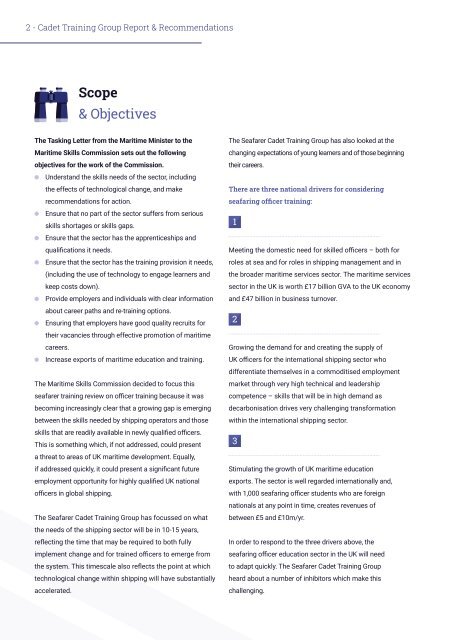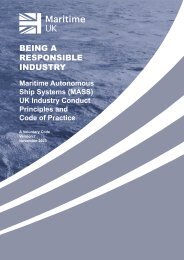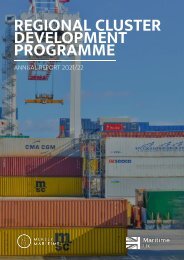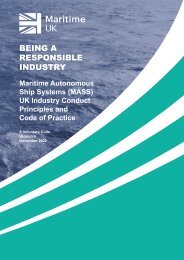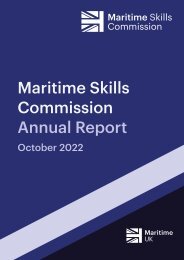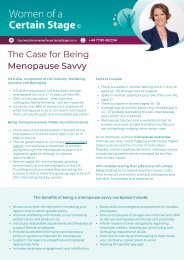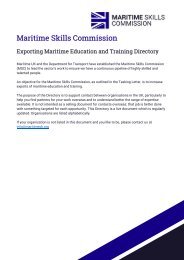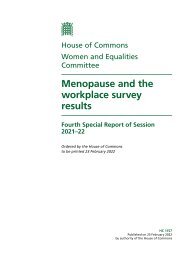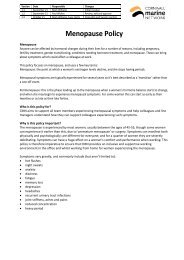Create successful ePaper yourself
Turn your PDF publications into a flip-book with our unique Google optimized e-Paper software.
2 - <strong>Cadet</strong> Training Group <strong>Report</strong> & <strong>Recommendations</strong><br />
Scope<br />
& Objectives<br />
Methodology<br />
The Tasking Letter from the Maritime Minister to the<br />
Maritime Skills Commission sets out the following<br />
objectives for the work of the Commission.<br />
Underst<strong>and</strong> the skills needs of the sector, including<br />
the effects of technological change, <strong>and</strong> make<br />
recommendations for action.<br />
Ensure that no part of the sector suffers from serious<br />
skills shortages or skills gaps.<br />
Ensure that the sector has the apprenticeships <strong>and</strong><br />
qualifications it needs.<br />
Ensure that the sector has the training provision it needs,<br />
(including the use of technology to engage learners <strong>and</strong><br />
keep costs down).<br />
Provide employers <strong>and</strong> individuals with clear information<br />
about career paths <strong>and</strong> re-training options.<br />
Ensuring that employers have good quality recruits for<br />
their vacancies through effective promotion of maritime<br />
careers.<br />
Increase exports of maritime education <strong>and</strong> training.<br />
The Maritime Skills Commission decided to focus this<br />
seafarer training review on officer training because it was<br />
becoming increasingly clear that a growing gap is emerging<br />
between the skills needed by shipping operators <strong>and</strong> those<br />
skills that are readily available in newly qualified officers.<br />
This is something which, if not addressed, could present<br />
a threat to areas of UK maritime development. Equally,<br />
if addressed quickly, it could present a significant future<br />
employment opportunity for highly qualified UK national<br />
officers in global shipping.<br />
The <strong>Seafarer</strong> <strong>Cadet</strong> Training Group has focussed on what<br />
the needs of the shipping sector will be in 10-15 years,<br />
reflecting the time that may be required to both fully<br />
implement change <strong>and</strong> for trained officers to emerge from<br />
the system. This timescale also reflects the point at which<br />
technological change within shipping will have substantially<br />
accelerated.<br />
The <strong>Seafarer</strong> <strong>Cadet</strong> Training Group has also looked at the<br />
changing expectations of young learners <strong>and</strong> of those beginning<br />
their careers.<br />
There are three national drivers for considering<br />
seafaring officer training:<br />
Meeting the domestic need for skilled officers – both for<br />
roles at sea <strong>and</strong> for roles in shipping management <strong>and</strong> in<br />
the broader maritime services sector. The maritime services<br />
sector in the UK is worth £17 billion GVA to the UK economy<br />
<strong>and</strong> £47 billion in business turnover.<br />
Growing the dem<strong>and</strong> for <strong>and</strong> creating the supply of<br />
UK officers for the international shipping sector who<br />
differentiate themselves in a commoditised employment<br />
market through very high technical <strong>and</strong> leadership<br />
competence – skills that will be in high dem<strong>and</strong> as<br />
decarbonisation drives very challenging transformation<br />
within the international shipping sector.<br />
Stimulating the growth of UK maritime education<br />
exports. The sector is well regarded internationally <strong>and</strong>,<br />
with 1,000 seafaring officer students who are foreign<br />
nationals at any point in time, creates revenues of<br />
between £5 <strong>and</strong> £10m/yr.<br />
In order to respond to the three drivers above, the<br />
seafaring officer education sector in the UK will need<br />
to adapt quickly. The <strong>Seafarer</strong> <strong>Cadet</strong> Training Group<br />
heard about a number of inhibitors which make this<br />
challenging.<br />
The members of the <strong>Cadet</strong> Training<br />
Group were:<br />
Lucy Armstrong<br />
Chair of the Port of Tyne<br />
Mark Dickinson<br />
General Secretary of<br />
Nautilus International<br />
Brian Johnson (Chair)<br />
Chief Executive of the Maritime<br />
<strong>and</strong> Coastguard Agency<br />
Sam McBriar<br />
Director of Maritime Strategy<br />
<strong>and</strong> Marketing at Thales<br />
Kathryn Neilson<br />
Director of the Merchant Navy<br />
Training Board<br />
Karen Waltham<br />
Independent HR Consultant<br />
The <strong>Seafarer</strong> <strong>Cadet</strong> Training Group received a series of<br />
inputs over a 6 month period from several colleges,<br />
shipping employers <strong>and</strong> officers <strong>and</strong> cadets. The group<br />
also received input from Lloyds Register covering<br />
the likely trajectory of technology change in shipping,<br />
<strong>and</strong> had input from the Department for Transport<br />
covering the current funding mechanism for<br />
cadet training.<br />
A survey of current cadets <strong>and</strong> recently qualified officers<br />
was carried out through Nautilus International <strong>and</strong> a<br />
workshop was held with a group of cadets <strong>and</strong> officers<br />
who responded to the survey.


